Exploring Contemporary Relations: Christianity, Judaism, and Islam
VerifiedAdded on 2022/09/10
|8
|1639
|17
Essay
AI Summary
This essay provides a detailed analysis of the contemporary relations between Christianity, Judaism, and Islam. It begins by outlining the theological foundations and historical backgrounds of each religion, highlighting key differences and commonalities. The essay then delves into the complexities of interfaith relations, examining the impact of political, economic, and social factors on the interactions between these three Abrahamic faiths. It explores the historical tensions, conflicts, and instances of cooperation, as well as the influence of cultural heritage and linguistic behaviors. Furthermore, the essay discusses the role of nationalism, ethnic identities, and the impact of events such as the 9/11 terrorist attacks on the perceptions and relationships between Christians, Jews, and Muslims. The essay also examines the importance of mutual understanding and dialogue in fostering peaceful coexistence, concluding that while contemporary circumstances present challenges, the core issues stem from human actions rather than religious doctrines themselves. The essay utilizes various sources to support its arguments and provide a comprehensive understanding of the subject.
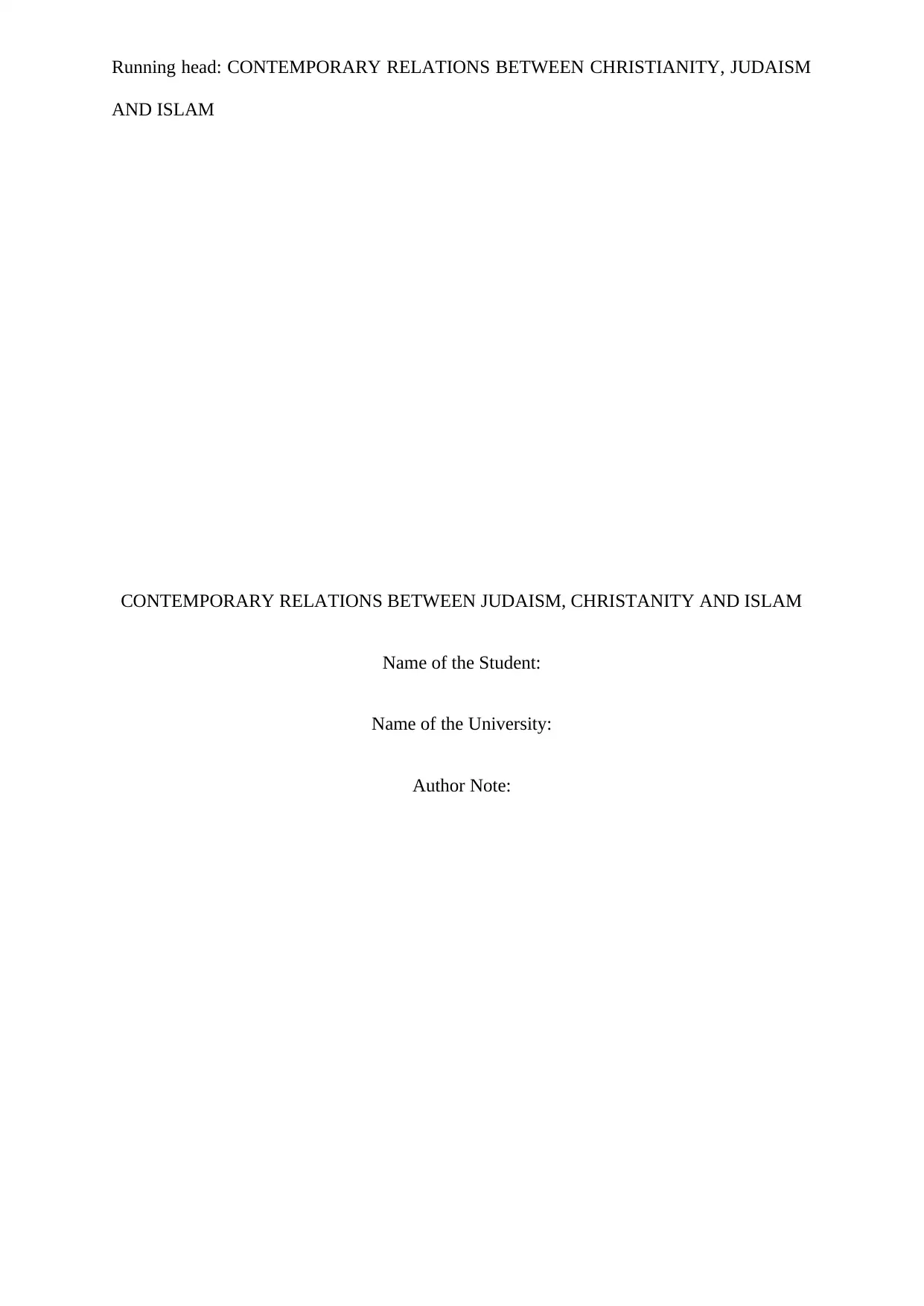
Running head: CONTEMPORARY RELATIONS BETWEEN CHRISTIANITY, JUDAISM
AND ISLAM
CONTEMPORARY RELATIONS BETWEEN JUDAISM, CHRISTANITY AND ISLAM
Name of the Student:
Name of the University:
Author Note:
AND ISLAM
CONTEMPORARY RELATIONS BETWEEN JUDAISM, CHRISTANITY AND ISLAM
Name of the Student:
Name of the University:
Author Note:
Paraphrase This Document
Need a fresh take? Get an instant paraphrase of this document with our AI Paraphraser
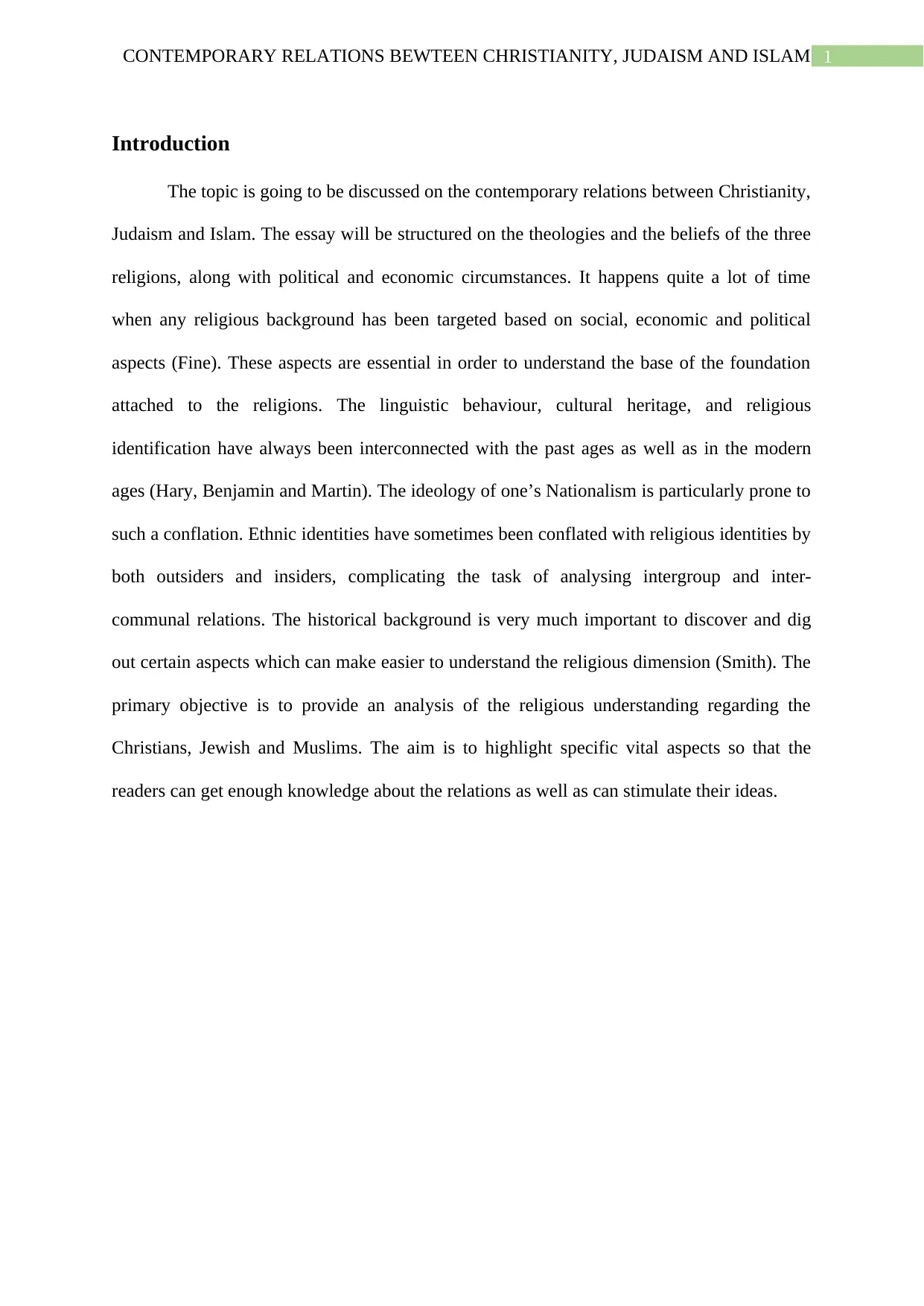
1CONTEMPORARY RELATIONS BEWTEEN CHRISTIANITY, JUDAISM AND ISLAM
Introduction
The topic is going to be discussed on the contemporary relations between Christianity,
Judaism and Islam. The essay will be structured on the theologies and the beliefs of the three
religions, along with political and economic circumstances. It happens quite a lot of time
when any religious background has been targeted based on social, economic and political
aspects (Fine). These aspects are essential in order to understand the base of the foundation
attached to the religions. The linguistic behaviour, cultural heritage, and religious
identification have always been interconnected with the past ages as well as in the modern
ages (Hary, Benjamin and Martin). The ideology of one’s Nationalism is particularly prone to
such a conflation. Ethnic identities have sometimes been conflated with religious identities by
both outsiders and insiders, complicating the task of analysing intergroup and inter-
communal relations. The historical background is very much important to discover and dig
out certain aspects which can make easier to understand the religious dimension (Smith). The
primary objective is to provide an analysis of the religious understanding regarding the
Christians, Jewish and Muslims. The aim is to highlight specific vital aspects so that the
readers can get enough knowledge about the relations as well as can stimulate their ideas.
Introduction
The topic is going to be discussed on the contemporary relations between Christianity,
Judaism and Islam. The essay will be structured on the theologies and the beliefs of the three
religions, along with political and economic circumstances. It happens quite a lot of time
when any religious background has been targeted based on social, economic and political
aspects (Fine). These aspects are essential in order to understand the base of the foundation
attached to the religions. The linguistic behaviour, cultural heritage, and religious
identification have always been interconnected with the past ages as well as in the modern
ages (Hary, Benjamin and Martin). The ideology of one’s Nationalism is particularly prone to
such a conflation. Ethnic identities have sometimes been conflated with religious identities by
both outsiders and insiders, complicating the task of analysing intergroup and inter-
communal relations. The historical background is very much important to discover and dig
out certain aspects which can make easier to understand the religious dimension (Smith). The
primary objective is to provide an analysis of the religious understanding regarding the
Christians, Jewish and Muslims. The aim is to highlight specific vital aspects so that the
readers can get enough knowledge about the relations as well as can stimulate their ideas.
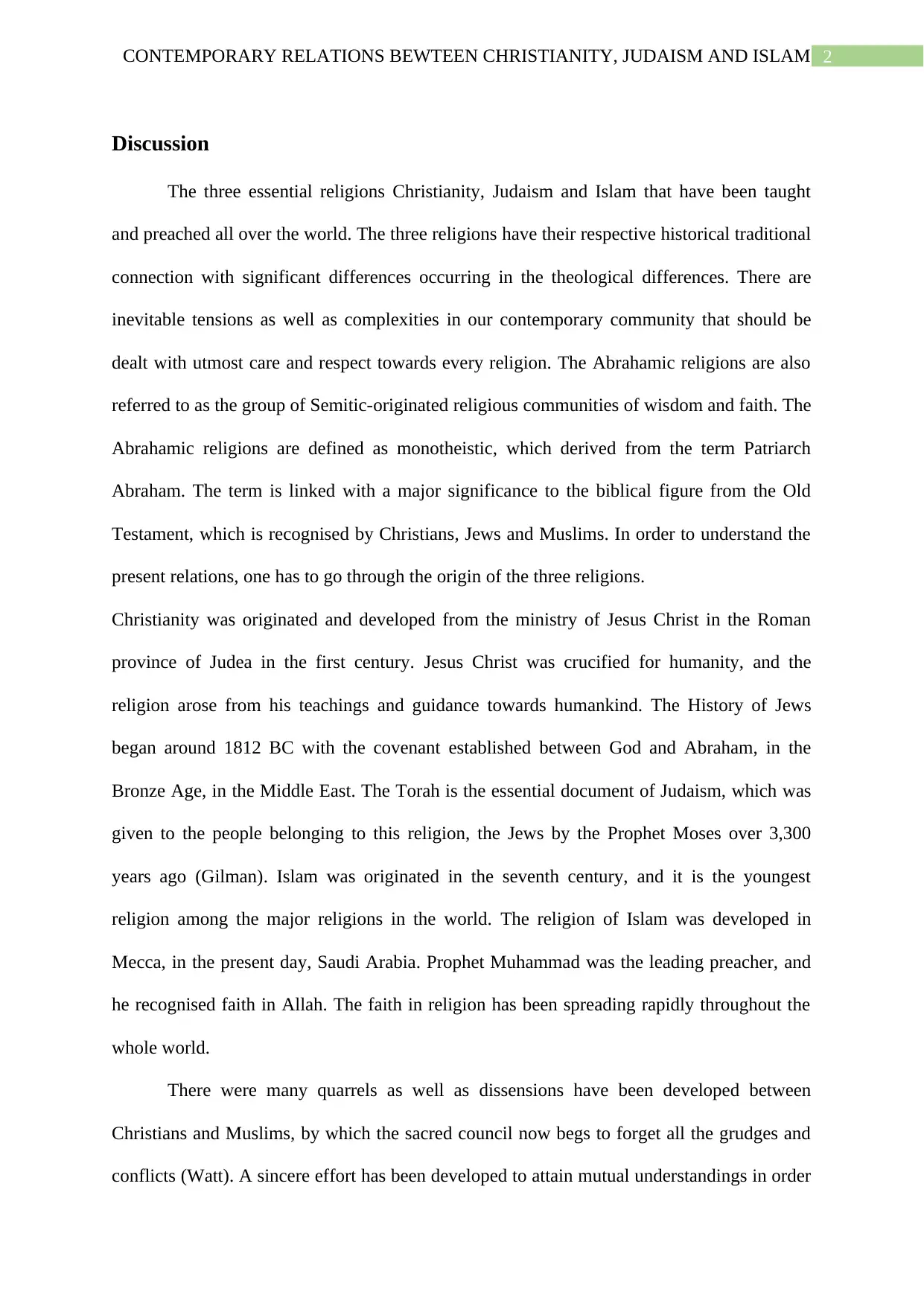
2CONTEMPORARY RELATIONS BEWTEEN CHRISTIANITY, JUDAISM AND ISLAM
Discussion
The three essential religions Christianity, Judaism and Islam that have been taught
and preached all over the world. The three religions have their respective historical traditional
connection with significant differences occurring in the theological differences. There are
inevitable tensions as well as complexities in our contemporary community that should be
dealt with utmost care and respect towards every religion. The Abrahamic religions are also
referred to as the group of Semitic-originated religious communities of wisdom and faith. The
Abrahamic religions are defined as monotheistic, which derived from the term Patriarch
Abraham. The term is linked with a major significance to the biblical figure from the Old
Testament, which is recognised by Christians, Jews and Muslims. In order to understand the
present relations, one has to go through the origin of the three religions.
Christianity was originated and developed from the ministry of Jesus Christ in the Roman
province of Judea in the first century. Jesus Christ was crucified for humanity, and the
religion arose from his teachings and guidance towards humankind. The History of Jews
began around 1812 BC with the covenant established between God and Abraham, in the
Bronze Age, in the Middle East. The Torah is the essential document of Judaism, which was
given to the people belonging to this religion, the Jews by the Prophet Moses over 3,300
years ago (Gilman). Islam was originated in the seventh century, and it is the youngest
religion among the major religions in the world. The religion of Islam was developed in
Mecca, in the present day, Saudi Arabia. Prophet Muhammad was the leading preacher, and
he recognised faith in Allah. The faith in religion has been spreading rapidly throughout the
whole world.
There were many quarrels as well as dissensions have been developed between
Christians and Muslims, by which the sacred council now begs to forget all the grudges and
conflicts (Watt). A sincere effort has been developed to attain mutual understandings in order
Discussion
The three essential religions Christianity, Judaism and Islam that have been taught
and preached all over the world. The three religions have their respective historical traditional
connection with significant differences occurring in the theological differences. There are
inevitable tensions as well as complexities in our contemporary community that should be
dealt with utmost care and respect towards every religion. The Abrahamic religions are also
referred to as the group of Semitic-originated religious communities of wisdom and faith. The
Abrahamic religions are defined as monotheistic, which derived from the term Patriarch
Abraham. The term is linked with a major significance to the biblical figure from the Old
Testament, which is recognised by Christians, Jews and Muslims. In order to understand the
present relations, one has to go through the origin of the three religions.
Christianity was originated and developed from the ministry of Jesus Christ in the Roman
province of Judea in the first century. Jesus Christ was crucified for humanity, and the
religion arose from his teachings and guidance towards humankind. The History of Jews
began around 1812 BC with the covenant established between God and Abraham, in the
Bronze Age, in the Middle East. The Torah is the essential document of Judaism, which was
given to the people belonging to this religion, the Jews by the Prophet Moses over 3,300
years ago (Gilman). Islam was originated in the seventh century, and it is the youngest
religion among the major religions in the world. The religion of Islam was developed in
Mecca, in the present day, Saudi Arabia. Prophet Muhammad was the leading preacher, and
he recognised faith in Allah. The faith in religion has been spreading rapidly throughout the
whole world.
There were many quarrels as well as dissensions have been developed between
Christians and Muslims, by which the sacred council now begs to forget all the grudges and
conflicts (Watt). A sincere effort has been developed to attain mutual understandings in order
⊘ This is a preview!⊘
Do you want full access?
Subscribe today to unlock all pages.

Trusted by 1+ million students worldwide
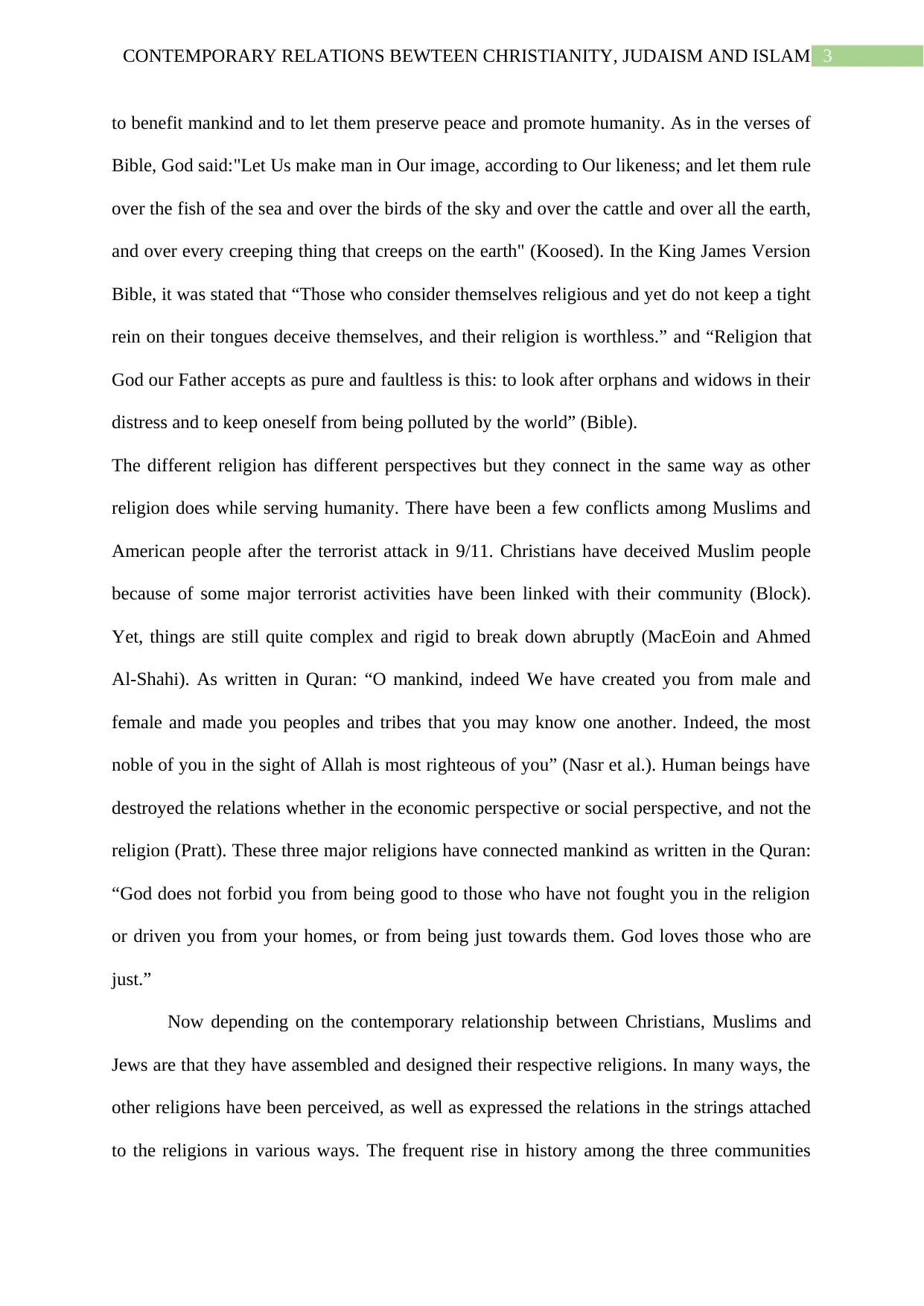
3CONTEMPORARY RELATIONS BEWTEEN CHRISTIANITY, JUDAISM AND ISLAM
to benefit mankind and to let them preserve peace and promote humanity. As in the verses of
Bible, God said:"Let Us make man in Our image, according to Our likeness; and let them rule
over the fish of the sea and over the birds of the sky and over the cattle and over all the earth,
and over every creeping thing that creeps on the earth" (Koosed). In the King James Version
Bible, it was stated that “Those who consider themselves religious and yet do not keep a tight
rein on their tongues deceive themselves, and their religion is worthless.” and “Religion that
God our Father accepts as pure and faultless is this: to look after orphans and widows in their
distress and to keep oneself from being polluted by the world” (Bible).
The different religion has different perspectives but they connect in the same way as other
religion does while serving humanity. There have been a few conflicts among Muslims and
American people after the terrorist attack in 9/11. Christians have deceived Muslim people
because of some major terrorist activities have been linked with their community (Block).
Yet, things are still quite complex and rigid to break down abruptly (MacEoin and Ahmed
Al-Shahi). As written in Quran: “O mankind, indeed We have created you from male and
female and made you peoples and tribes that you may know one another. Indeed, the most
noble of you in the sight of Allah is most righteous of you” (Nasr et al.). Human beings have
destroyed the relations whether in the economic perspective or social perspective, and not the
religion (Pratt). These three major religions have connected mankind as written in the Quran:
“God does not forbid you from being good to those who have not fought you in the religion
or driven you from your homes, or from being just towards them. God loves those who are
just.”
Now depending on the contemporary relationship between Christians, Muslims and
Jews are that they have assembled and designed their respective religions. In many ways, the
other religions have been perceived, as well as expressed the relations in the strings attached
to the religions in various ways. The frequent rise in history among the three communities
to benefit mankind and to let them preserve peace and promote humanity. As in the verses of
Bible, God said:"Let Us make man in Our image, according to Our likeness; and let them rule
over the fish of the sea and over the birds of the sky and over the cattle and over all the earth,
and over every creeping thing that creeps on the earth" (Koosed). In the King James Version
Bible, it was stated that “Those who consider themselves religious and yet do not keep a tight
rein on their tongues deceive themselves, and their religion is worthless.” and “Religion that
God our Father accepts as pure and faultless is this: to look after orphans and widows in their
distress and to keep oneself from being polluted by the world” (Bible).
The different religion has different perspectives but they connect in the same way as other
religion does while serving humanity. There have been a few conflicts among Muslims and
American people after the terrorist attack in 9/11. Christians have deceived Muslim people
because of some major terrorist activities have been linked with their community (Block).
Yet, things are still quite complex and rigid to break down abruptly (MacEoin and Ahmed
Al-Shahi). As written in Quran: “O mankind, indeed We have created you from male and
female and made you peoples and tribes that you may know one another. Indeed, the most
noble of you in the sight of Allah is most righteous of you” (Nasr et al.). Human beings have
destroyed the relations whether in the economic perspective or social perspective, and not the
religion (Pratt). These three major religions have connected mankind as written in the Quran:
“God does not forbid you from being good to those who have not fought you in the religion
or driven you from your homes, or from being just towards them. God loves those who are
just.”
Now depending on the contemporary relationship between Christians, Muslims and
Jews are that they have assembled and designed their respective religions. In many ways, the
other religions have been perceived, as well as expressed the relations in the strings attached
to the religions in various ways. The frequent rise in history among the three communities
Paraphrase This Document
Need a fresh take? Get an instant paraphrase of this document with our AI Paraphraser
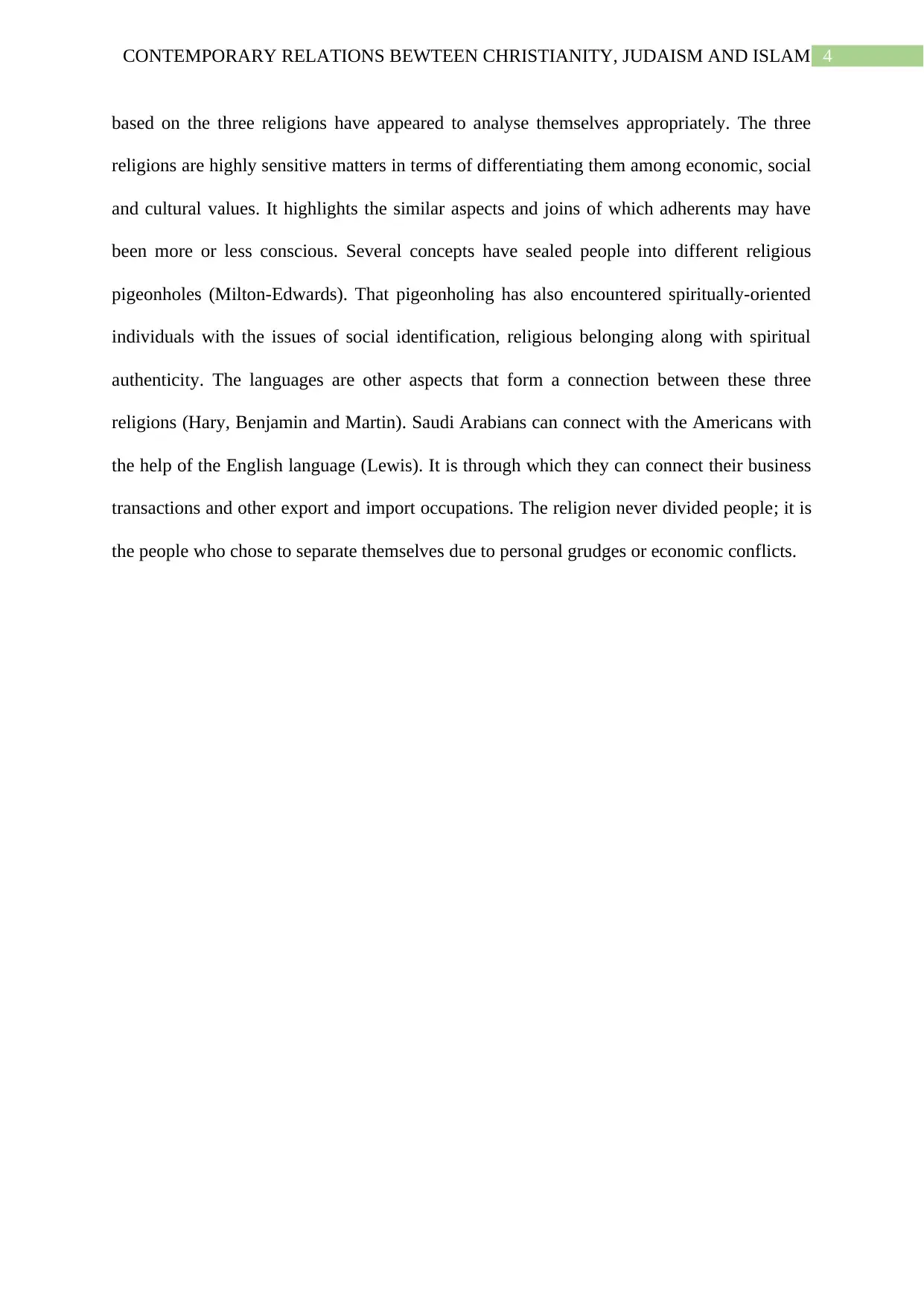
4CONTEMPORARY RELATIONS BEWTEEN CHRISTIANITY, JUDAISM AND ISLAM
based on the three religions have appeared to analyse themselves appropriately. The three
religions are highly sensitive matters in terms of differentiating them among economic, social
and cultural values. It highlights the similar aspects and joins of which adherents may have
been more or less conscious. Several concepts have sealed people into different religious
pigeonholes (Milton-Edwards). That pigeonholing has also encountered spiritually-oriented
individuals with the issues of social identification, religious belonging along with spiritual
authenticity. The languages are other aspects that form a connection between these three
religions (Hary, Benjamin and Martin). Saudi Arabians can connect with the Americans with
the help of the English language (Lewis). It is through which they can connect their business
transactions and other export and import occupations. The religion never divided people; it is
the people who chose to separate themselves due to personal grudges or economic conflicts.
based on the three religions have appeared to analyse themselves appropriately. The three
religions are highly sensitive matters in terms of differentiating them among economic, social
and cultural values. It highlights the similar aspects and joins of which adherents may have
been more or less conscious. Several concepts have sealed people into different religious
pigeonholes (Milton-Edwards). That pigeonholing has also encountered spiritually-oriented
individuals with the issues of social identification, religious belonging along with spiritual
authenticity. The languages are other aspects that form a connection between these three
religions (Hary, Benjamin and Martin). Saudi Arabians can connect with the Americans with
the help of the English language (Lewis). It is through which they can connect their business
transactions and other export and import occupations. The religion never divided people; it is
the people who chose to separate themselves due to personal grudges or economic conflicts.
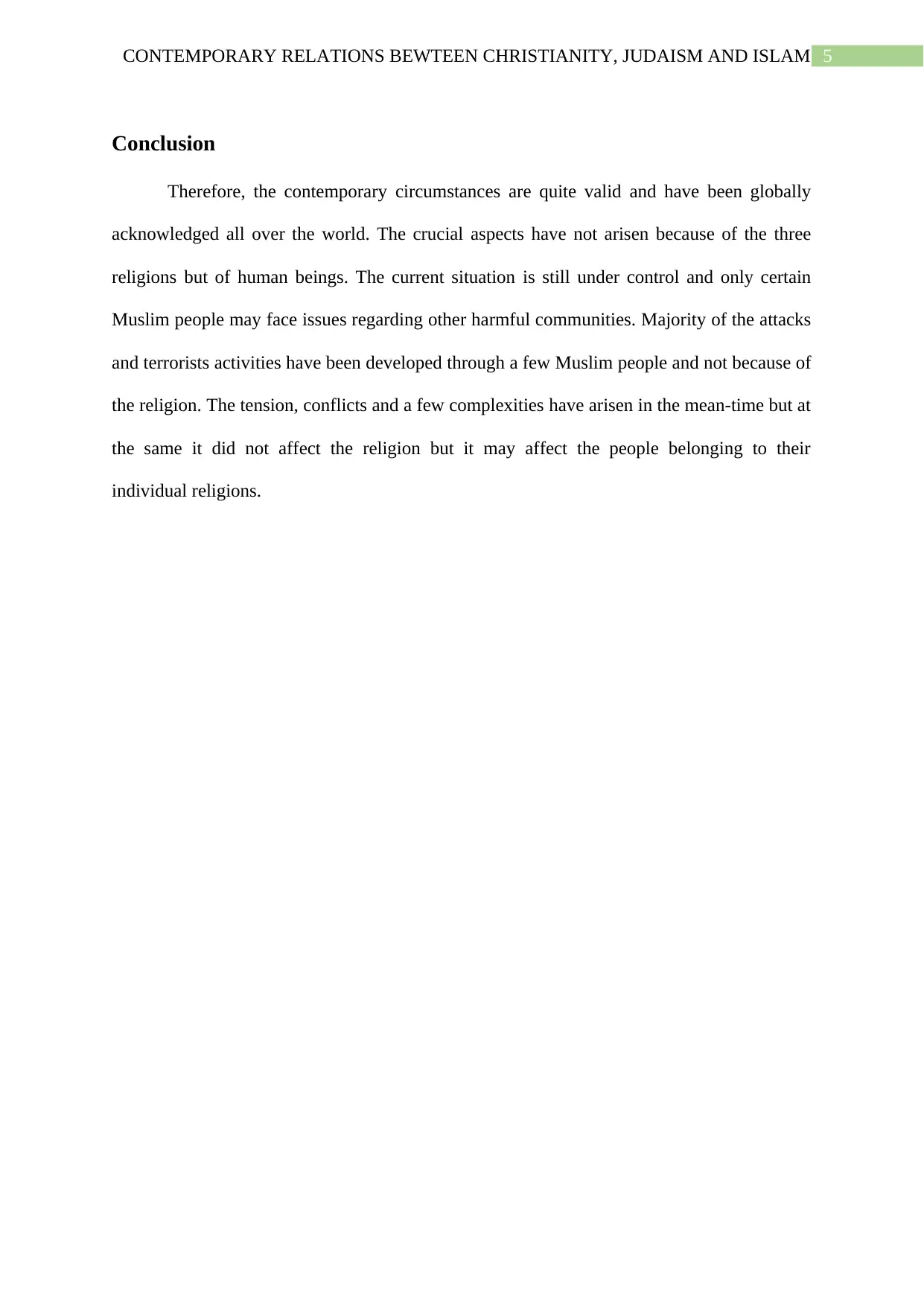
5CONTEMPORARY RELATIONS BEWTEEN CHRISTIANITY, JUDAISM AND ISLAM
Conclusion
Therefore, the contemporary circumstances are quite valid and have been globally
acknowledged all over the world. The crucial aspects have not arisen because of the three
religions but of human beings. The current situation is still under control and only certain
Muslim people may face issues regarding other harmful communities. Majority of the attacks
and terrorists activities have been developed through a few Muslim people and not because of
the religion. The tension, conflicts and a few complexities have arisen in the mean-time but at
the same it did not affect the religion but it may affect the people belonging to their
individual religions.
Conclusion
Therefore, the contemporary circumstances are quite valid and have been globally
acknowledged all over the world. The crucial aspects have not arisen because of the three
religions but of human beings. The current situation is still under control and only certain
Muslim people may face issues regarding other harmful communities. Majority of the attacks
and terrorists activities have been developed through a few Muslim people and not because of
the religion. The tension, conflicts and a few complexities have arisen in the mean-time but at
the same it did not affect the religion but it may affect the people belonging to their
individual religions.
⊘ This is a preview!⊘
Do you want full access?
Subscribe today to unlock all pages.

Trusted by 1+ million students worldwide
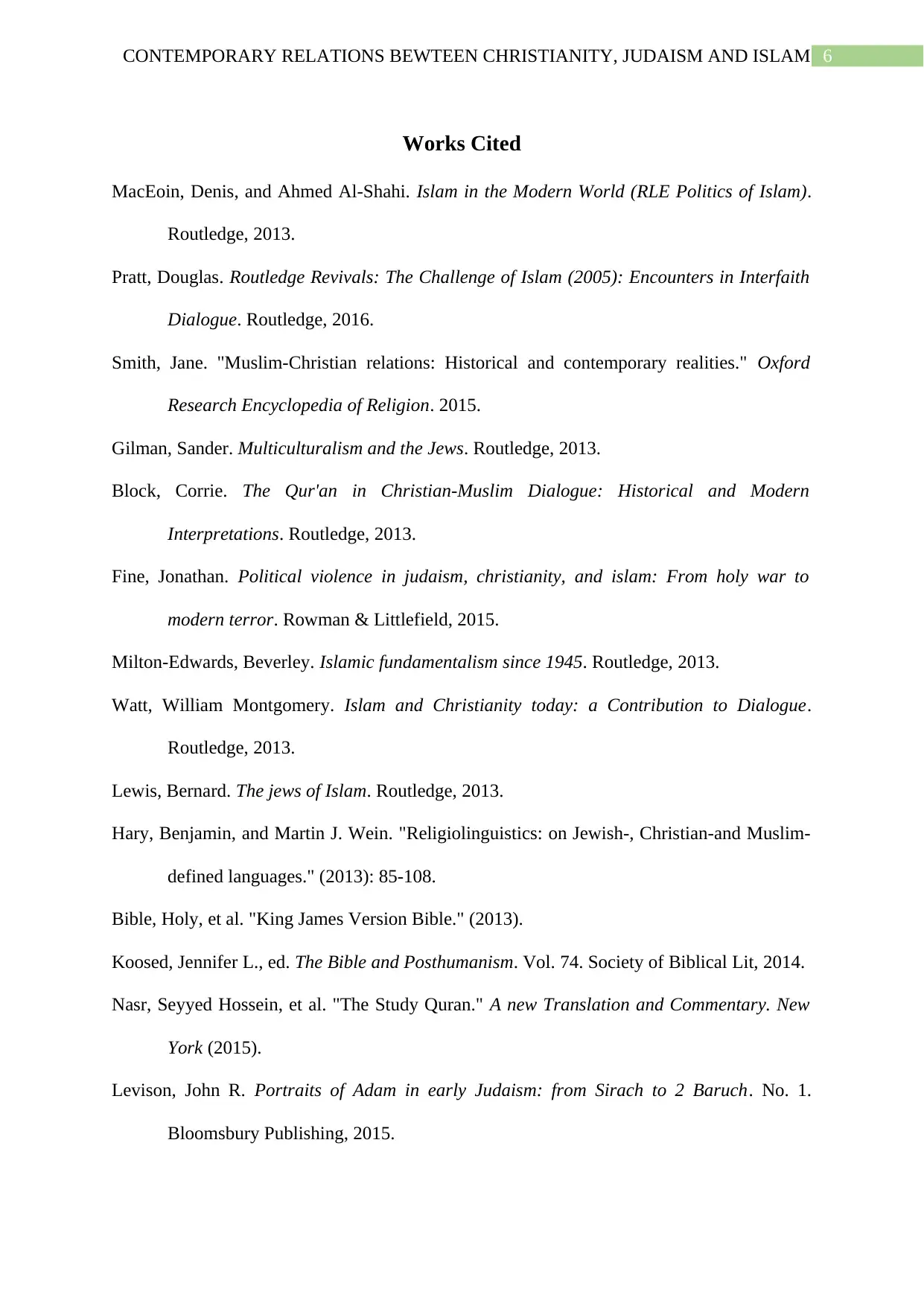
6CONTEMPORARY RELATIONS BEWTEEN CHRISTIANITY, JUDAISM AND ISLAM
Works Cited
MacEoin, Denis, and Ahmed Al-Shahi. Islam in the Modern World (RLE Politics of Islam).
Routledge, 2013.
Pratt, Douglas. Routledge Revivals: The Challenge of Islam (2005): Encounters in Interfaith
Dialogue. Routledge, 2016.
Smith, Jane. "Muslim-Christian relations: Historical and contemporary realities." Oxford
Research Encyclopedia of Religion. 2015.
Gilman, Sander. Multiculturalism and the Jews. Routledge, 2013.
Block, Corrie. The Qur'an in Christian-Muslim Dialogue: Historical and Modern
Interpretations. Routledge, 2013.
Fine, Jonathan. Political violence in judaism, christianity, and islam: From holy war to
modern terror. Rowman & Littlefield, 2015.
Milton-Edwards, Beverley. Islamic fundamentalism since 1945. Routledge, 2013.
Watt, William Montgomery. Islam and Christianity today: a Contribution to Dialogue.
Routledge, 2013.
Lewis, Bernard. The jews of Islam. Routledge, 2013.
Hary, Benjamin, and Martin J. Wein. "Religiolinguistics: on Jewish-, Christian-and Muslim-
defined languages." (2013): 85-108.
Bible, Holy, et al. "King James Version Bible." (2013).
Koosed, Jennifer L., ed. The Bible and Posthumanism. Vol. 74. Society of Biblical Lit, 2014.
Nasr, Seyyed Hossein, et al. "The Study Quran." A new Translation and Commentary. New
York (2015).
Levison, John R. Portraits of Adam in early Judaism: from Sirach to 2 Baruch. No. 1.
Bloomsbury Publishing, 2015.
Works Cited
MacEoin, Denis, and Ahmed Al-Shahi. Islam in the Modern World (RLE Politics of Islam).
Routledge, 2013.
Pratt, Douglas. Routledge Revivals: The Challenge of Islam (2005): Encounters in Interfaith
Dialogue. Routledge, 2016.
Smith, Jane. "Muslim-Christian relations: Historical and contemporary realities." Oxford
Research Encyclopedia of Religion. 2015.
Gilman, Sander. Multiculturalism and the Jews. Routledge, 2013.
Block, Corrie. The Qur'an in Christian-Muslim Dialogue: Historical and Modern
Interpretations. Routledge, 2013.
Fine, Jonathan. Political violence in judaism, christianity, and islam: From holy war to
modern terror. Rowman & Littlefield, 2015.
Milton-Edwards, Beverley. Islamic fundamentalism since 1945. Routledge, 2013.
Watt, William Montgomery. Islam and Christianity today: a Contribution to Dialogue.
Routledge, 2013.
Lewis, Bernard. The jews of Islam. Routledge, 2013.
Hary, Benjamin, and Martin J. Wein. "Religiolinguistics: on Jewish-, Christian-and Muslim-
defined languages." (2013): 85-108.
Bible, Holy, et al. "King James Version Bible." (2013).
Koosed, Jennifer L., ed. The Bible and Posthumanism. Vol. 74. Society of Biblical Lit, 2014.
Nasr, Seyyed Hossein, et al. "The Study Quran." A new Translation and Commentary. New
York (2015).
Levison, John R. Portraits of Adam in early Judaism: from Sirach to 2 Baruch. No. 1.
Bloomsbury Publishing, 2015.
Paraphrase This Document
Need a fresh take? Get an instant paraphrase of this document with our AI Paraphraser

7CONTEMPORARY RELATIONS BEWTEEN CHRISTIANITY, JUDAISM AND ISLAM
1 out of 8
Related Documents
Your All-in-One AI-Powered Toolkit for Academic Success.
+13062052269
info@desklib.com
Available 24*7 on WhatsApp / Email
![[object Object]](/_next/static/media/star-bottom.7253800d.svg)
Unlock your academic potential
Copyright © 2020–2026 A2Z Services. All Rights Reserved. Developed and managed by ZUCOL.





